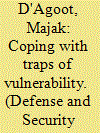|
|
|
Sort Order |
|
|
|
Items / Page
|
|
|
|
|
|
|
| Srl | Item |
| 1 |
ID:
121152


|
|
|
|
|
| Publication |
2013.
|
| Summary/Abstract |
In a world virtually free of slavery and colonialism and one mainly driven by the sovereign state rationale, allusion to manifestations or the existence of some form of these phenomena within a state is often received with dumbfounding indifference or denial. However, a form of rule that had continued in South Sudan long after the departure of the British in 1956 was colonial both in its quintessence and flair in that it disenfranchised its citizens and denied them the most basic freedoms, services and development. Under this establishment, resistance against the coercive vision of the state was brutally suppressed for many decades. This state of affairs finally ended in July 2011. Nonetheless, there is a miscellany of unresolved post-colonial issues between the two countries that warrant attention. These include security and the demarcation of borders, the issue of ludicrous transit fees for South Sudan's oil exportation through Sudan, citizenship, external debt repayment, etc. These issues are part of traps inherited from the anti-colonial struggle, which have now supplanted the old ensemble of North-South conflict paroxysm. As a matter of urgency, the two countries will have to wrap up the incomplete process of negotiation on these substantive issues. The talks should be approached with a new mindset based on the new reality of two sovereign states. To the extent that it is widely established that South Sudan and Sudan must coexist peacefully in order to develop into viable entities, such mutual dependency must be based on equality and respect.
|
|
|
|
|
|
|
|
|
|
|
|
|
|
|
|
| 2 |
ID:
119499


|
|
|
|
|
| Publication |
2013.
|
| Summary/Abstract |
The assumption that an insurgency effort must culminate in the seizure of state power became the go-to cliché of the twentieth-century understandings of the Civil War. However, historical counterfactuals about Sudan's civil wars have cavilled at the accuracy of this postulate. This article argues that Sudan constitutes an outlier which does not perfectly fit this established convention. In essence, many factors have combined to be the sources of Sudan's intractable, periphery-originated civil wars. Since the Torit Mutiny in August 1955, virtually all these uprisings have exhibited deep failings in inducing a complete change in the centre; or separating any part of the country through military means. Succinctly put, they have, with no exception, ended in a negotiated settlement rather than through a decisive military victory by the rebels. Based on the findings of this study, state violence, ethnic politics, and power struggle among the rebels, as well as geography, geopolitics, and the permeability of the borders have emerged as key explanatory variables to this alternative hypothesis.
|
|
|
|
|
|
|
|
|
|
|
|
|
|
|
|
|
|
|
|
|